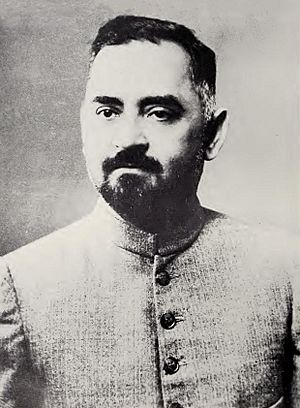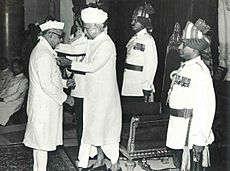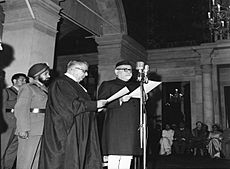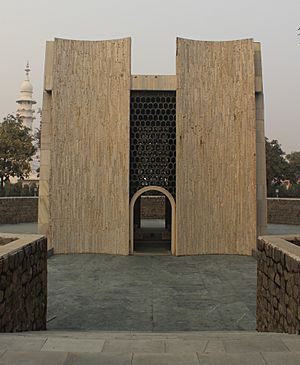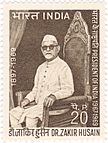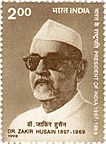Zakir Husain facts for kids
Quick facts for kids
Zakir Husain
|
|
|---|---|
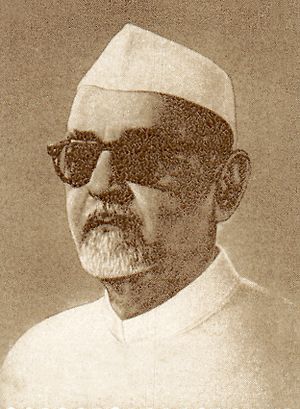
Husain on a 1998 post stamp of India
|
|
| 3rd President of India | |
| In office 13 May 1967 – 3 May 1969 |
|
| Prime Minister | Indira Gandhi |
| Vice President | Varahagiri Venkata Giri |
| Preceded by | Sarvepalli Radhakrishnan |
| Succeeded by | Varahagiri Venkata Giri (acting) |
| 2nd Vice President of India | |
| In office 13 May 1962 – 13 May 1967 |
|
| President | Sarvepalli Radhakrishnan |
| Prime Minister |
|
| Preceded by | Sarvepalli Radhakrishnan |
| Succeeded by | Varahagiri Venkata Giri |
| 4th Governor of Bihar | |
| In office 6 July 1957 – 11 May 1962 |
|
| Chief Minister |
|
| Preceded by | R. R. Diwakar |
| Succeeded by | Madabhushi Ananthasayanam Ayyangar |
| Member of Parliament, Rajya Sabha (nominated) |
|
| In office 3 April 1952 – 6 July 1957 |
|
| Personal details | |
| Born | 8 February 1897 Hyderabad, Hyderabad State, British India (present-day Telangana, India) |
| Died | 3 May 1969 (aged 72) New Delhi, India |
| Political party | Independent |
| Spouse |
Shah Jahan Begum
(m. 1915) |
| Children | 2 |
| Relatives |
|
| Alma mater |
|
| Profession | Economist |
| Awards |
|
Zakir Husain Khan (born 8 February 1897 – died 3 May 1969) was an important Indian leader. He was a great teacher and politician. He served as the third president of India from 13 May 1967 until he passed away on 3 May 1969.
Zakir Husain was born in Hyderabad. He studied at Muhammadan Anglo-Oriental College and later earned a special degree in economics from the University of Berlin. He was a close friend of Mahatma Gandhi. Husain helped start Jamia Millia Islamia, a national university. He was its Vice-Chancellor from 1926 to 1948.
In 1937, he led a committee that created a new education plan called Nai Talim. This plan focused on free and required education in a child's first language. After India became independent in 1947, Husain stayed in India. In 1948, he became the Vice-Chancellor of Aligarh Muslim University.
For his work in education, he received the Padma Vibhushan award in 1954. He was also a member of the Indian Parliament from 1952 to 1957. Husain served as Governor of Bihar from 1957 to 1962. Then, he was elected Vice President of India in 1962. The next year, he received India's highest civilian award, the Bharat Ratna.
In 1967, he was elected President. He was the first Muslim to hold this high position in India. He was also the first President to die while in office. His time as President was the shortest of any Indian President. His resting place (mausoleum) is on the campus of Jamia Millia Islamia in Delhi.
Zakir Husain wrote and translated many books into Urdu. He also wrote many books for children. India has honored him with postage stamps. Many schools, libraries, roads, and even Asia's largest rose garden are named after him.
Contents
Early Life and Education
Zakir Husain was born in Hyderabad in 1897. His family had roots in the town of Kaimganj in Uttar Pradesh. His father, Fida Husain Khan, was a successful lawyer in Hyderabad. Zakir was the third of seven sons.
He learned Quran, Persian, and Urdu at home. He also went to primary school in Hyderabad. After his father died in 1907, his family moved back to Qaimganj. He then went to Islamia High School in Etawah. Sadly, his mother and other family members died in a plague in 1911.
In 1913, he finished high school. He joined the Muhammadan Anglo-Oriental College in Aligarh. He later studied at Lucknow Christian College to prepare for a medical degree. However, he became ill and had to stop his studies for a year. He rejoined the college in Aligarh.
Husain graduated in 1918 with degrees in philosophy, English literature, and economics. He was a great debater and became vice president of the college's student union. He continued his studies in law and economics. After getting his master's degree in 1920, he became a lecturer at the college.
Family Life
In 1915, while still a student, Husain married Shahjahan Begum. They had two daughters, Sayeeda Khan and Safia Rahman. His grandson, Salman Khurshid, later became India's External Affairs Minister in 2012.
His brother, Yusuf Husain, became a famous historian. Another brother, Mahmud Husain, became the Minister of Education in Pakistan.
Career in Education
Leading Jamia Millia Islamia (1926–1948)
In 1920, Mahatma Gandhi visited the Muhammadan Anglo-Oriental College. He asked people to stop cooperating with the British rulers. Because of this, some students and teachers started the Independent National University. This university aimed to provide education without British influence. It was later named Jamia Millia Islamia.
Zakir Husain was one of the founders of this university. It moved from Aligarh to Delhi in 1925. He became its "Sheikh-ul-Jamia" (Vice-Chancellor) in 1926. Jamia wanted to educate Muslim youth to be good Indian citizens. It also aimed to blend Islamic and Hindu ideas to create a united nation.
In 1922, Husain went to Germany to get a doctorate in economics from the University of Berlin. He finished his degree in 1926. While in Berlin, he helped translate 33 of Gandhi's speeches into German.
When he returned to India in 1926, he became the Vice-Chancellor of Jamia Millia Islamia. He traveled all over India to raise money for the university. He received support from Mahatma Gandhi and other important people.
In 1928, a society was formed to manage Jamia. Zakir Husain became its secretary. Members of this society promised to work for the university for 20 years. The university's rules said it would not accept help from the British government. It also promised to treat all religions fairly. Husain believed Jamia's goal was to keep Islamic culture alive and help India achieve freedom. He remained Vice-Chancellor until 1948.
Husain was against the idea of separate elections for Muslims. He was a political opponent of Muhammad Ali Jinnah. However, Husain convinced Jinnah to attend Jamia's 25th-anniversary celebration in 1946. At a time of growing tension between different groups, Husain made a powerful speech. He asked leaders to stop the hatred and work together for the country's future.
Basic National Education Plan (1937)
In October 1937, a conference was held to plan basic education for India. Mahatma Gandhi led this meeting. The conference asked Zakir Husain to lead a committee. This committee was to create a detailed plan for this new education policy.
The committee presented its report in December 1937. This plan was called the Wardha Scheme of Basic National Education, or Nai Talim. It suggested teaching crafts in schools and promoting good citizenship. It also proposed seven years of free and required basic education in the child's mother tongue. The plan included teaching crafts, music, drawing, and the Hindustani language. It also had a plan for training teachers.
The Congress party accepted this plan in 1938. They wanted to use it across the country. An All-India Education Board was set up to carry out the plan, with Husain as its president. India's later education policies in 1968, 1988, and 2020 all used ideas from this Wardha Scheme.
After India was divided in 1947, Husain worked to help people affected by violence in Delhi. The buildings of Jamia Millia Islamia were damaged during this time.
Vice-Chancellor, Aligarh Muslim University (1948–1956)
In 1948, Husain became the Vice-Chancellor of Aligarh Muslim University. This university had been linked to the movement for Pakistan. The Indian government wanted to ensure it remained a national institution.
Husain took charge in 1950 after recovering from a heart attack. He worked to change the university's image. He focused on bringing back discipline and filling teaching positions with excellent scholars. In 1951, a new law made Aligarh Muslim University an official institution of the Indian government. This helped the university become stable and grow. By the end of his time there, Husain had greatly improved the university.
Husain was also a nominated member of the Rajya Sabha (a part of the Indian Parliament) from 1952 to 1957. In 1954, he received the Padma Vibhushan award for his work in culture and education. He also served on the executive board of UNESCO from 1957 to 1958.
Political Career
Governor of Bihar (1957–1962)
Zakir Husain served as the Governor of Bihar from 1957 to 1962. As Governor, he also acted as the Chancellor of Patna University. He made important decisions about university leadership.
Vice President of India (1962–1967)
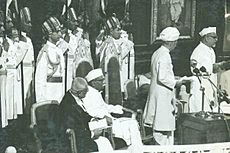
On 14 April 1962, the Congress party chose Husain as their candidate for Vice President of India. He won the election on 7 May 1962, with a large number of votes. He was sworn in as Vice President on 13 May 1962.
In 1962, he was also nominated as the Vice President of the Sahitya Akademi, an important literary organization. The next year, he received the Bharat Ratna, India's highest civilian award. In 1965, he briefly served as acting president when President Radhakrishnan was away for medical treatment.
As the Chairman of the Rajya Sabha, Husain made important rulings about how Parliament worked. He clarified rules for ministers and members of parliament.
President of India (1967–1969)
Zakir Husain was chosen as the Congress party's candidate for President in 1967. Prime Minister Indira Gandhi supported his nomination. The election was a close contest. Some opposition parties supported another candidate. The campaign included some harsh comments, but Husain won the election.
He received 471,244 votes, while his opponent received 363,971 votes. This victory was important for Prime Minister Gandhi. Husain was declared elected on 9 May 1967. His election was seen as a way for the Congress Party to connect with India's Muslim population. It also showed the world that India was a secular nation.
Husain was sworn in as President on 13 May 1967. In his first speech, he said, "The whole of Bharat is my home and its people are my family." He promised to work hard to make India strong and beautiful.
He was the first Muslim and the first state governor to become President of India. During his time as President, he made state visits to countries like Canada, Hungary, and the Soviet Union. Husain loved roses and helped introduce new varieties to the Mughal Gardens at the Rashtrapati Bhavan (President's House).
Author and Translator
Zakir Husain wrote many books in Urdu. He also translated several books into Urdu. These included books on economics and philosophy, like Plato's Republic.
He wrote a lot about education in books such as Aala Taleem and Qaumi Taleem. He also wrote about famous Urdu poets like Altaf Hussain Hali and Mirza Ghalib. Husain wrote several stories for children, which he published under a pen name. Some of these stories were translated into English.
His lectures on economics were published as Capitalism: An Essay in Understanding. As President, he led a committee to celebrate the 100th anniversary of Ghalib's birth. He also opened the Ghalib Academy in Delhi in 1969.
Death and Legacy
Zakir Husain had a mild heart attack earlier in 1969. He became unwell after returning from a trip to Assam. He died in the Rashtrapati Bhavan on 3 May 1969, from a heart attack. Vice President V. V. Giri became acting president that same day.
The Indian government declared thirteen days of national mourning. About 200,000 people paid their respects as his body lay in state. His funeral was held on 5 May 1969. He was buried in the university campus of Jamia Millia Islamia. His death was also mourned in Pakistan. Leaders from many countries, including the Soviet Union and the United States, attended his funeral.
Zakir Husain was the first President of India to die while in office. He also had the shortest time in office.
His tomb was built in 1971 and designed by Habib Rahman. The design combines modern and traditional Indian styles. The tomb has eight curved walls and a shallow dome. The graves of Husain and his wife are under the dome.
How He Is Remembered
India Post issued special postage stamps honoring Husain in 1969 and 1998. A documentary film about his life, A Rose Called Zakir Hussain – A Life of Dedication, was made in 1969.
Many places are named after him. In 1975, Delhi College was renamed the Zakir Husain Delhi College. The Zakir Husain Centre for Educational Studies at Jawaharlal Nehru University and the Dr. Zakir Husain Central Library at Jamia Millia Islamia are also named after him. Wellesley Road in Delhi was renamed Dr. Zakir Hussain Marg. The Zakir Hussain Rose Garden in Chandigarh, which is Asia's largest rose garden, is also named after him. A book about him, Dr. Zakir Hussain – Teacher who became President, was released in 2000.
Images for kids
See also
 In Spanish: Zakir Husain para niños
In Spanish: Zakir Husain para niños
 | James B. Knighten |
 | Azellia White |
 | Willa Brown |


